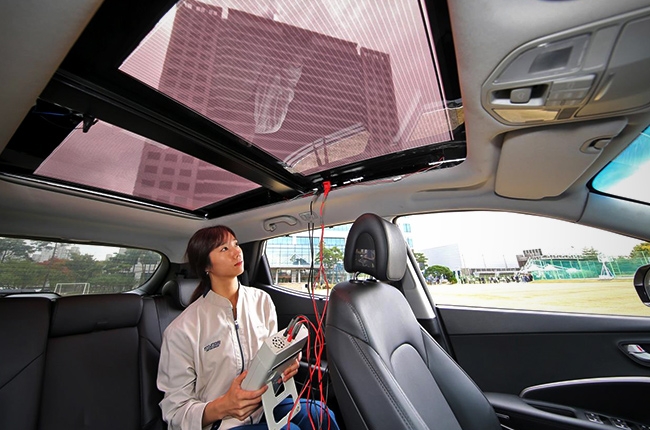
Self-regenerating batteries aren’t a big thing, yet, for now. The first steps are currently being worked on, which could possibly be the solid-state battery, and it’s become more likely a trend for development nowadays. However, this does not mean that it’s a long road to batteries that need less charging time and that there are no shortcuts.
Thankfully, for the sake of battery efficiency in automobiles, Hyundai and Kia are exploring external electricity-generators to charge their cars’ batteries. The two South Korean automakers are putting solar panels on the roof of their vehicles. Now, this may not be the kind which can power an entire electric motor but, at least, we’re advancing.
“In the future, we expect to see many different types of electricity-generating technologies integrated into our vehicles. The solar roof is the first of these technologies and will mean that automobiles no longer passively consume energy, but will begin to produce it actively. It is an exciting development for us, designing a technology for vehicle owners to help them shift from being energy users to being energy producers.”
Solar panel on automobiles isn’t completely a hot news. Hybrid and EVs from different car manufacturers have already tapped into solar energy sometime before this one. Apparently, those realms were where solar power proved to be just as good as doing minor tasks like powering air-condition fans. Well, at least, an energy source for less cost, right?
The two Korean brands claim that the solar roof can charge the car’s battery from 30 to 60 percent per day. This output can vary depending on the weather, which means if it’s rainy, the numbers will obviously drop.
Currently, Hyundai and Kia are developing three solar cells for internal combustion engine-powered (ICE) cars and all-electric vehicles. The first-generation solar panel roof technology is designed for hybrids, the second-gen will feature a semi-transparent solar roof for ICE models, while the third-gen's expected to boast a lightweight solar roof for EVs. Solar roofs on Hyundai and Kia units will be launched in 2020 and is expected to help boost the companies’ efforts in meeting the global regulations on vehicle emission.

So, what? Does having a solar roof mean you always need to park your car under the scorching heat of the sun? You know, to get that idle charging while you buy the groceries. Well, we have an idea. Why can’t someone make a solar car cover that’s: one, easy to deploy and fold away; two, has a heat-resisting material underneath the solar panels. That way, parking under the sun wouldn’t be a real problem. Everyone’s welcome to play around the idea, folks.
Latest News
-
Lynk & Co 900 breaks cover at Shanghai, will it catch on in the Philippines? / News
Lynk & Co officially launched the new 900 SUV at the 2025 Shanghai Auto Show, and top Philippine motoring media were there to get an early look. With over 40,000 pre-orders even before its o...
-
Hyundai's next hybrid system brings more power and better fuel savings / News
Hyundai has shared its next hybrid system that will give its future cars more power and better fuel savings. It will first show up in the 2026 Palisade, but there’s a good chance it could be...
-
The Nissan N7 is out, and a hybrid Frontier Pickup is coming next / News
Nissan has introduced two new models at Auto Shanghai 2025: the all-electric N7 sedan and the all-new Frontier Pro plug-in hybrid pickup. The N7 is now available in China, while the Frontier...
Popular Articles
-
Cheapest cars under P700,000 in the Philippines
Jerome Tresvalles · Sep 02, 2024
-
First car or next car, the Ford EcoSport is a tough package to beat
Jun 18, 2021
-
Car Maintenance checklist and guide – here’s everything you need to know
Earl Lee · Jan 12, 2021
-
Most fuel efficient family cars in the Philippines
Bryan Aaron Rivera · Nov 27, 2020
-
2021 Geely Okavango — Everything you need to know
Joey Deriquito · Nov 19, 2020
-
Family cars in the Philippines with the biggest trunks
Sep 20, 2023
-
Head to head: Toyota Rush vs. Suzuki XL7
Joey Deriquito · Oct 28, 2020
-
Why oil changes are important for your car
Earl Lee · Nov 10, 2020
-
2021 Kia Stonic — What you need to know about it
Joey Deriquito · Oct 16, 2020
-
Top 7 tips for buying a used car in the Philippines
Joey Deriquito · Nov 26, 2020



